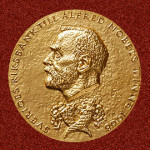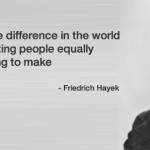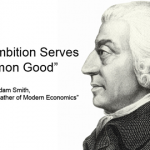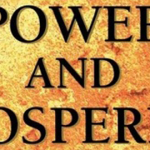
Free Market Thinkers who Won the Sveriges Riksbank Prize in Economic Sciences
In The Making of Modern Economics: The Lives and Ideas of Great Thinkers, Mark Skousen, the esteemed economic analyst, stated that the Swedes mostly rewarded free-market economists. The Swedish Central Bank started the Prize

Visa Restrictions from China Sharply Hit Macau’s Growth
Macau’s growth has been sharply hit as anti-corruption regulations in China, along with a ban on smoking in the Macau casinos and visa restrictions for gambling in Macau

On Joseph Schumpeter’s Idea of Creative Destruction
Creative destruction refers to the continuous product and process innovation mechanism by which new units of production replace outdated ones.

Top 3 Pro Capitalist Hollywood Movies
Over the years, a number of movies have revolved around capitalism, system stability and economic crisis. There are an even greater number of documentaries

Sheldon Richman: His Beliefs and Contributions
An American writer, Sheldon Richman, is the vice president of The Future of Freedom Foundation (FFF) as well as the editor of the monthly journal of the FFF,

Friedrich Hayek: Teacher, Philosopher, Author and More
During the Great Depression, John Maynard Keynes and Friedrich Hayek were building their economic models. After fighting out their fundamental differences at various debates, Keynes prevailed.

Frederic Bastiat – A Rebel Against Regulation
Nothing exposes the absurdity of government regulation better than Frederic Bastiat’s satiric article – The Candlemaker’s Petition. This classic describes a petition taken out by candle makers against what they term as an unfair competitor – the Sun itself!

Free Markets – Making Virtues Out of Necessities
“It is not from the benevolence of the butcher, the brewer, or the baker that we expect our dinner, but from their regard to their own interest.” – Adam Smith
Unabashed self interest may not be the ideal position to take in terms of moral thought, but it is the single most effective catalyst for economics that is as progressive and robust as it is fair. Why do people do the things they do? Why do they get up in the morning, and go about their business as a routine? In almost all cases, they are either trying to earn a living, or preparing themselves to be able to do so in the future. Who are they doing this for if not for themselves, and perhaps, their near and dear ones? The fact is, any economic activity that people engage in, is meant largely to serve their own personal interest.

Competition is Pivotal to the Sustenance of Free Markets
It is a fact that the biggest and the most successful business organizations in the world today are the ones that face the most competition in their respective industries domestically. Another well established fact is that nations and states that practice economies that come closest to being ‘Perfect Competitions’ have, not just the most satisfied and prosperous consumers,

A Review of Mancur Olson’s Power and Prosperity
Renowned social scientist and economist Mancur Olson is best known for his treatise called The Logic of Collective Action. But, it is another work of his that also deserves attention. In Power and Prosperity, Olson deals with the oft repeated question – why does an economic divide persist between countries?
 Rakesh Wadhwa. Ever since, I was a school boy, I knew India was on the wrong path. Socialism was just not what we needed to get ahead. Government controlled our travel; government controlled our ability to buy and sell; and government controlled our freedom to move our money. My life has focused on the inherent rights people have. When I was in college, I never understood, what the governments meant by their "socialistic attitude". If people are free to buy, sell and move their capital themselves without any restrictions by state, then the welfare of people is inevitable & hence the countries they live in will become wealthy. The government has no right whatsoever, to point a finger at me or my business. I am not a revolutionary. I just want to light up my cigarette and not get nagged about it. I believe in non-interfering attitude to attain more.
Rakesh Wadhwa. Ever since, I was a school boy, I knew India was on the wrong path. Socialism was just not what we needed to get ahead. Government controlled our travel; government controlled our ability to buy and sell; and government controlled our freedom to move our money. My life has focused on the inherent rights people have. When I was in college, I never understood, what the governments meant by their "socialistic attitude". If people are free to buy, sell and move their capital themselves without any restrictions by state, then the welfare of people is inevitable & hence the countries they live in will become wealthy. The government has no right whatsoever, to point a finger at me or my business. I am not a revolutionary. I just want to light up my cigarette and not get nagged about it. I believe in non-interfering attitude to attain more. 
 The Bastiat Award is a journalism award, given annually by the International Policy Network, London. Bastiat Prize entries are judged on intellectual content, the persuasiveness of the language used and the type of publication in which they appear. Rakesh Wadhwa won the 3rd prize (a cash award of $1,000 and a candlestick), in 2006.
The Bastiat Award is a journalism award, given annually by the International Policy Network, London. Bastiat Prize entries are judged on intellectual content, the persuasiveness of the language used and the type of publication in which they appear. Rakesh Wadhwa won the 3rd prize (a cash award of $1,000 and a candlestick), in 2006.
What the readers are saying…